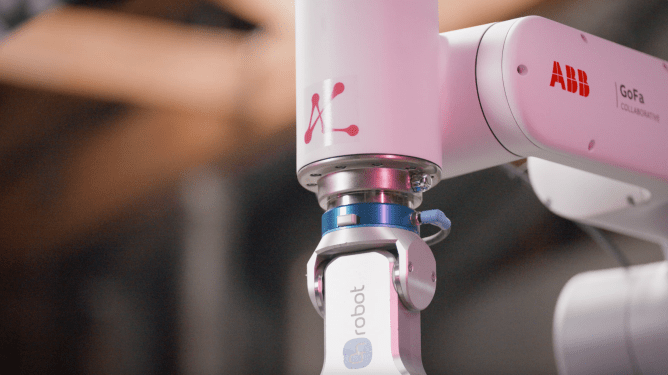Robots can be programmed to perform a wide range of tasks, from packing boxes to performing surgery. However, each specific movement or task requires its own dedicated training process, which makes it difficult for robots to adapt in real-world scenarios. Mbodi aims to make robot training easier and faster with the help of AI agents. The company will showcase this technology as one of the Top 20 Startup Battlefield finalists at TechCrunch Disrupt 2025.
Based in New York, Mbodi built a cloud-to-edge system, which is a hybrid computing system using both cloud and local processing. This system is designed to integrate into existing robotic technology stacks. The software relies on multiple AI agents that communicate with each other to gather the necessary information to help a robot learn a task more quickly.
Once deployed, Mbodi will collect data and learn from its real-world applications. Xavier Chi, co-founder and CEO of Mbodi, explained that users prompt the software using natural language, and Mbodi breaks the request down into smaller subtasks. The cluster of agents then divides and conquers the task to gather the information needed to train the robot on the prompt rapidly.
Chi noted that the challenge with the physical world is its infinite possibilities. He stated that whenever something completely new is invented, there is no existing data for it, which is a fundamental problem in the physical world. He emphasized the need for a system that can orchestrate different models or allow anyone to correct a robot and instruct it on how to perform tasks in specific ways.
Chi and his co-founder, Sebastian Peralta, conceived the idea for the company while working as engineers at Google. Although they were not working in robotics at the time, they both recognized that advancements in AI were moving into the physical world. Despite a growing interest in physical AI, they observed there was still no effective method for training robots quickly.
Many other companies, such as Skild AI and FieldAI, are also working to accelerate robot training by building large world AI models with extensive real-world data. This approach is intended to help robots adapt to new environments. However, Chi believes that philosophy is flawed because it does not account for the constant changes in the world.
Mbodi launched in 2024 with an initial focus on picking and packaging. The company won an ABB Robotics AI startup competition last year, which led to a partnership with the Swiss robotics organization that was later acquired by SoftBank for 5.4 billion dollars in October.
The company is now working on a proof of concept with a Fortune 100 company in the consumer packaged goods space. Chi explained that this customer faces a challenge because the products they pack into trays or shelves change every day. This constant variation makes it impossible to use traditional robots, as reprogramming them is not feasible, so human workers still perform much of this work.
Mbodi hopes to begin deploying its software more broadly in 2026. Chi stated that the company’s goal is to build something that works and can be reliably deployed. He emphasized that they are not a research lab and are focused on putting a functional product into production.

